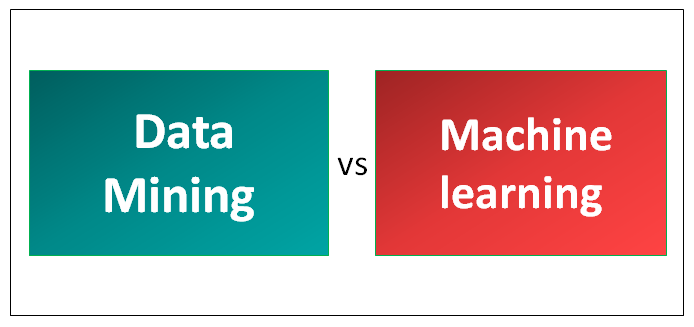Updated June 14, 2023
Difference Between Data Mining and Machine Learning
Data mining, introduced in 1930, involves finding potentially useful, hidden, and valid patterns from large amounts of data. While machine learning introduced in near 1950 involves new algorithms from the data as well as previous experience to train and make predictions from the models, both of them intersect at the point of having useful datasets but other than that, they have various differences based upon the responsibilities, origin, Implementation, Nature, Application, Abstractions, Techniques and scope.
Head to Head comparison Between Data mining and Machine learning (Infographics)
Below is the Top 10 Comparision between Data mining and Machine learning:
Key Differences Between Data Mining and Machine Learning
Let us discuss some of the major differences between Data Mining and Machine Learning:
- To implement data mining techniques, it used two-component first one are the database and the second one is machine learning. The Database offers data management techniques, while machine learning offers data analysis techniques. But to implement machine learning techniques, it used algorithms.
- Data Mining uses more data to extract useful information, and that particular data will help to predict some future outcomes; for example, a sales company uses last year’s data to predict this sale, but machine learning will not rely much on data. It uses algorithms, for example, OLA and UBER machine learning techniques, to calculate the ETA for rides.
- Self-learning capacity is not present in data mining; it follows the rules and is predefined. It will provide the solution for a particular problem, but machine learning algorithms are self-defined and can change their rules as per the scenario; it will find out the solution for a particular problem and resolve it in its own way.
- The main and foremost difference between data mining and machine learning is without the involvement of humans, data mining can’t work, but in machine learning, human effort is involved only at the time when the algorithm is defined. After that, it will conclude everything by itself once implemented forever to use, but this is not the case with data mining.
- The result produced by machine learning will be more accurate than data mining since machine learning is an automated process.
- Data mining uses the database or data warehouse server, data mining engine, and pattern evaluation techniques to extract useful information. In contrast, machine learning uses neural networks, predictive models, and automated algorithms to make decisions.
Data Mining and Machine Learning Comparison Table
Below are the lists of points that describe the comparison between Data Mining and Machine Learning.
| Basis for Comparison | Data Mining | Machine Learning |
| Meaning | Extracting knowledge from a large amount of data | Introduce a new algorithm from data as well as past experience |
| History | Introduced in 1930, initially referred as knowledge discovery in databases | Introduced in near 1950, the first program was Samuel’s checker-playing program |
| Responsibility | Data mining is used to get the rules from the existing data. | Machine learning teaches the computer to learn and understand the given rules. |
| Origin | Traditional databases with unstructured data | Existing data as well as algorithms. |
| Implementation | We can develop our own models where we can use data mining techniques for | We can use machine learning algorithms in decision trees, neural networks, and some other areas of artificial intelligence. |
| Nature | Involves human interference more manually. | Automated, once design is self-implemented, no human effort |
| Application | used in cluster analysis | used in web search, spam filter, credit scoring, fraud detection, computer design |
| Abstraction | Data mining abstract from the data warehouse | Machine learning reads machine |
| Techniques Involved | Data mining is more of research using methods like machine learning | Self-learned and trained system to do the intelligent task. |
| Scope | Applied in the limited area | It can be used in a vast area. |
Conclusion
In most cases now, data mining is used to predict the result from historical data or find a new solution from the existing data. Most of organization uses this technique to drive business outcomes where machine learning techniques are growing in a much faster way since it overcomes the problems with what data mining techniques have. But to drive the business still, we need to have data mining process because it will define the problem of a particular business, and to resolve such problem, we can use machine learning techniques. In one word, we can say that to drive a business, both Data mining and Machine learning techniques have to work hand in hand, one technique will define the problem, and the other will give you the solution in a much more accurate way.
Recommended Articles
This has been a guide to Data Mining vs Machine Learning. Here we have discussed Data Mining vs Machine Learning head-to-head comparison and key differences, along with infographics and comparison table. You may also look at the following articles to learn more –




